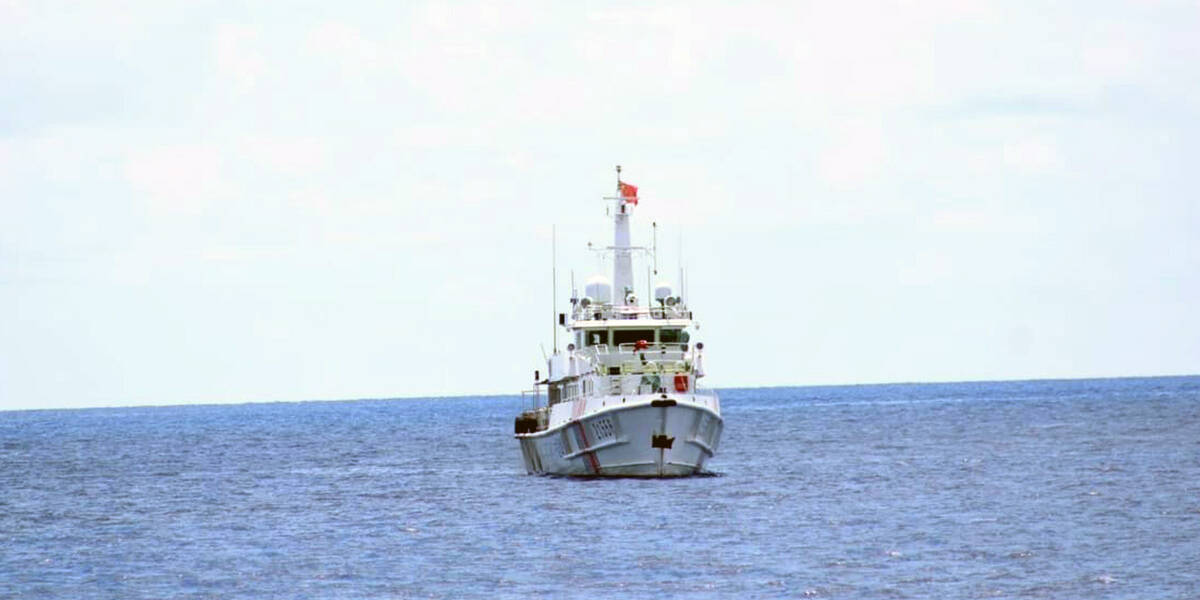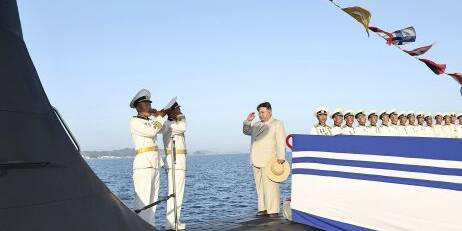Graeme Dobell, for ASPI The Strategist
In the Taiwan Strait on Saturday, a Chinese People’s Liberation Army Navy ship and a US Navy ship came within 150 yards of a collision.
The US says the Chinese warship crossed the bow of the US destroyer in an ‘unsafe’ manoeuvre that ‘violated the maritime “rules of the road” of safe passage in international waters’.
China’s defence minister, General Li Shangfu, retorted that the US was being provocative and its ship should not have been there. He advised the Americans to ‘mind your own business’.
A clash of intents and interests could have cost lives and sparked a superpower confrontation.
The near miss at sea framed the US–China failures on display at Asia’s premier security dialogue taking place at the same time in Singapore.
At the Shangri-La Dialogue in Singapore over the weekend, China and the US talked at each other but didn’t actually talk.
The stakes are so high, yet the actual US–China dialogue at Shangri-La is so small. Plenty of words. Well-rehearsed statements of positions and pointed accusations. But not much listening and little exchange.
That’s why Anthony Albanese made the centrepiece of his keynote address to the dialogue on Friday the need for more talking in the Indo-Pacific and guardrails ‘to prevent a worst-case scenario’. The prime minister was speaking just before a version of that scenario nearly unfolded at sea.
When Li addressed the dialogue on Sunday, he said China had no problem with innocent passage for trade: ‘We have never hurt any of those ships. However, we do see some ships [from] outside the region exercise hegemony of navigation.’
The first two questions the minister faced were about the ‘dangerous and unprofessional’ Chinese actions in the Taiwan Strait and why China was refusing military-to-military talks with the US to establish crisis communications. Li’s pushback was that China would respond to provocation. His speech had the usual Chinese boilerplate: Taiwan is Chinese. One-China policy. Internal issue.
At the end of the session, the director-general of the International Institute for Strategic Studies, John Chipman, asked a wrap-up question about Chinese ships and planes causing near misses. Li responded:
We have codes for encounters at sea and air reached with many other countries to prevent unnecessary dangers. But I want to also raise a question on the incidents you mention. Why did all those incidents happen in areas near China, not in areas near other countries? I think that is because Chinese air or navy vessels do not do access near other countries. To truly prevent such incidents in the future, we do not only need the codes we have. The best way is for other countries’ planes and ships not to do actions around other countries.
Li’s sum-up advice to the US and its allies was his bumper-sticker line: ‘Mind your own business.’
The strange element in the verbal push and shove is that the Chinese minister declined the chance in Singapore to deliver his message face to face with his US counterpart.
US Defense Secretary Lloyd Austin did manage to walk up and shake hands with Li. For Chinese officials, that unscripted moment was a handshake ambush. So even a handshake can get a negative read. And the handshake was the limit of personal contact, as Austin lamented:
Dialogue is not a reward. It is a necessity. And a cordial handshake over dinner is no substitute for a substantive engagement. And the more that we talk, the more that we can avoid the misunderstandings and miscalculations that could lead to crisis or conflict. You know, I am deeply concerned that the PRC has been unwilling to engage more seriously on better mechanisms for crisis management between our two militaries. But I hope that will change, and soon.
Speaking just before the ship incident, Austin pointed to an ‘alarming number’ of risky Chinese intercepts of ‘US and allied aircraft flying lawfully in international airspace’.
In his speech, he warned five times against coercion and added three references to bullying. ‘All of this is especially important in the Taiwan Strait,’ he said. The US would categorically oppose unilateral changes to the status quo from China or Taiwan:
I’d also highlight that conflict is neither imminent or inevitable. Deterrence is strong today—and it’s our job to keep it that way. You know, the whole world has a stake in maintaining peace and stability in the Taiwan Strait—the whole world. The security of commercial shipping lanes and global supply chains depends on it. And so does freedom of navigation worldwide. But make no mistake: conflict in the Taiwan Strait would be devastating.
Albanese offered a similar warning, saying the consequences of a breakdown in the Taiwan Strait ‘would not be confined to the big powers or the site of their conflict; they would be devastating for the world.’
As the dialogue’s host, the International Institute for Strategic Studies offers an overview of trends with its annual Asia–Pacific security assessment. Nigel Inkster’s chapter, ‘Strained US–China relations and the growing threat to Taiwan’, argues that Beijing’s goal of ‘reunification’ with Taiwan by the PRC centenary in 2049 is still only an aspiration. Claims by US military leaders that China may use military force against Taiwan in the next few years, he says, are based not on ‘firm intelligence’ but an assessment of when China will have the military capability for an attack.
Inkster notes the estimate that a war in the Taiwan Strait would cause an immediate US$2 trillion hit to the global economy, and concludes:
It is impossible to determine whether China will use force to take Taiwan at some point in the future. Such force might take a variety of forms, ranging from a contested amphibious assault to concerted missile attacks and bombardments or a naval blockade. China has prepared for all these options, including via ‘lawfare’ by claiming that the Taiwan Strait is not an international waterway. In any case, the decision on whether to resort to armed force is arguably no longer just in China’s hands; rather, it has become a function of the dynamic that has evolved between Beijing and Washington.
Ships dicing in the Taiwan Strait carry a trillion-dollar price tag as well as the risk of war. The US and China have much to talk about. A handshake ambush is better than being ambushed by history.
The original article can be found here at The Strategist.
Graeme Dobell is a senior fellow at ASPI.
Feature Image: via Wikimedia Commons
Related Analyses
September 15, 2024
West Philippine Sea: Several factors force BRP Teresa Magbanua to return – PCG
0 Comments1 Minute


